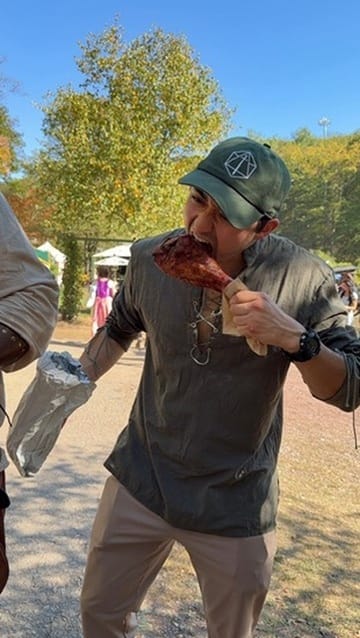- The Metagame
- Posts
- ♟️ The Metagame #042: Does Practice Make Perfect?
♟️ The Metagame #042: Does Practice Make Perfect?
The art of doing the same thing over and over again.
Before we get into today’s topic, here are a few life updates:
Finished three more books this month—Gifted & Talented, Dark Matter, and The Secret of Secrets (the latter of the three is Dan Brown’s latest installment of the Robert Langdon series, probably my favorite series of all time)
Went to my first Renaissance Faire (picture of me feasting on a turkey leg at the Ren Faire featured at the end 🍗)
Beat my office’s Rubik’s Cube record (0:58.79 🏁)
Also, I wanted to plug my two latest projects again, which have changed my life for the better:
 Lexica is a daily vocabulary agent that sends you a word-of-the-day text every morning. My reading comprehension, writing abilities, and overall communication have never been better. |  Market Pulse is an impressive data aggregation system that simplifies the stock market and gives you the most important updates. If you’re an active investor, this is one of the best investments you can make. |
Okay, enough of the shameless plugs. Let’s talk about practice.
Read time: 3 minutes
Last week, my Krav Maga instructor, Gus, asked me a strange question.
“When you play chess or poker, do you think about your next move?”
Of course I think about the next move, that’s how games of strategy are played.
But he followed up with this:
“Do you really think about the next move? Or do you just know?”
That got me thinking.
How often am I strategically thinking—using my math and probability skills, reading social cues, etc.—and how often am I just going with my gut feeling?
The Art of Practice
Muscle memory is a myth.
Muscles don’t have memory. When we refer to muscle memory, it’s really our brains rewiring synapses and “learning” the ideal motions and movements after performing them over and over again.
Aka “practice.”
So when I practice disarming an attacker with a gun, I’m training my brain to “know” what to do in this scenario. Is the gun pointed at my head? My chest? Is my attacker holding it with one or two hands? How close are they?
These are all questions I ask myself when I’m training.
And the more I practice, the better (and faster) I get at executing.
But I’m still in training.
My instructor would tell you his thoughts are completely different when in the same situation.
If you put him in this exact same scenario and asked him what was going on in his mind, he would tell you he wasn’t thinking of anything.
That’s because he’s practiced these maneuvers so many times, he doesn’t even need to think. He just acts.
It’s all gut reaction and instincts at this point because of the level of expertise he’s honed over the years.
For games of strategy where I excel, the same idea rings true.
While I’m no Phil Ivey, I still make a lot of poker moves on gut reaction.
Some poker players, especially in the online world, will argue that this is a terrible strategy and that I need to play by the book to be unexploitable and have the best win rate.
While this case holds water, games of imperfect information (like poker) have nuisances that strictly playing by the math tends to ignore.
Playing poker like a perfect robot is only a good strategy if you're playing against other perfect robots. As soon as humans and our imperfect brains are introduced into the equation, perfect strategy goes out the window.
Be Mindless
There’s a Buddhist concept and mental state called mushin that means “no-mind.”
As Gus says:
“To be mushin is to be mindless.”
When your mind is free from conscious thought and emotion, you allow for spontaneous and smooth actions.
And this is why “practice makes perfect.”
Practice doesn't train our muscles to “remember” the best golf swing or play a musical instrument.
(Sure, your muscles do get stronger and you build up stamina through hours of practice… but they still don’t “remember.”)
Practice trains our brains to learn a skill.
And once we practice for long enough, we stop consciously thinking about the skill.
We just perform.
You’ve almost certainly heard this famous quote before, but it perfectly sums up the art of practice, and it felt wrong not to use this one.
“I fear not the man who has practiced 10,000 kicks once, but I fear the man who has practiced one kick 10,000 times.”
Turkey leg, as promised.

Thanks for reading!
If you have any questions, hit me up on LinkedIn or on Twitter/𝕏 at @sam_starkman, or feel free to reply to this email!

— Sam